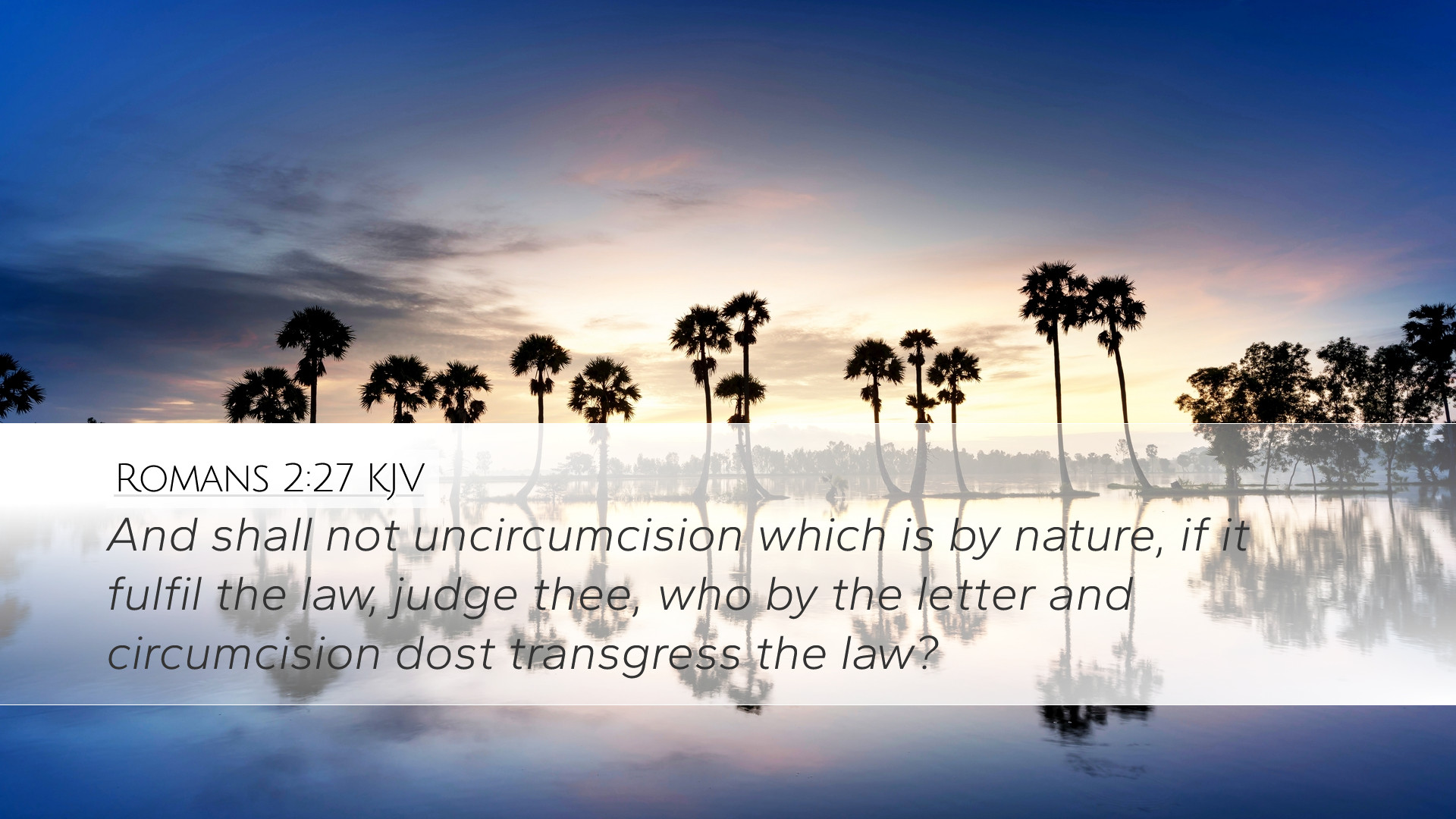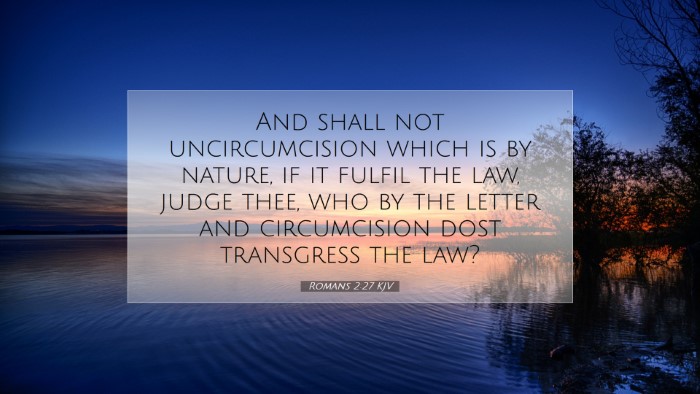Commentary on Romans 2:27
Introduction
Romans 2:27 presents a profound theological assertion regarding the value of inner righteousness over mere outward compliance with the law. This verse functions as a culmination of Paul’s discussion regarding the nature of true obedience to God, emphasizing that spiritual heritage or physical circumcision is of little value without a corresponding inward transformation. The insights from esteemed public domain commentaries such as those by Matthew Henry, Albert Barnes, and Adam Clarke will facilitate a deeper understanding of this verse, enriching the theological reflections for pastors, students, and scholars alike.
Text of the Verse
“And shall not uncircumcision which is by nature, if it fulfill the law, judge thee, who by the letter and circumcision dost transgress the law?” - Romans 2:27 (KJV)
Exegesis of the Verse
This verse continues Paul’s argument concerning Jewish privilege and the universality of sin. In Romans 2:25-29, Paul asserts that physical circumcision, a symbol of the Jewish covenant with God, cannot save the Jew if he does not keep the law. In contrast, the uncircumcised (Gentiles) who keep the law are considered righteous, posing a challenge to Jewish identity and pride.
Matthew Henry emphasizes the hypocrisy of relying on external symbols rather than genuine faith and behavior. He states that an uncircumcised person who genuinely lives in accordance with God’s commandments has an authentic status before God, surpassing those who merely rely on their Jewish heritage.
Albert Barnes echoes this, asserting that Paul highlights the futility of Jewish reliance on the law without the spirit of the law. Barnes notes, “Outward observances and a mere profession without the essential qualities of faith and righteousness are useless in God’s sight.”
Moreover, Adam Clarke elaborates on the concept of "judgment" in this context, indicating that the Gentile's adherence to God’s will allows them to stand in judgment against Jews who fall short of God's requirements despite their covenant status. Clarke suggests that this serves as a profound challenge to racial and cultural pride.
Theological Implications
The implications of Romans 2:27 are critical for understanding Paul’s broader theological framework concerning grace, faith, and works. This verse advocates a radical shift from an understanding of righteousness as something merely inherited or externally expressed to a new definition rooted in personal faith and moral integrity.
-
Conversion of Heart: True conversion requires an inward change, which is a theme prominent throughout Paul's writings. He insists that the "circumcision of the heart" is an essential sign of a true believer (Romans 2:29).
-
The Equality of All People Before God: Paul dismantles the exclusivity of Jewish privilege, asserting that righteousness is available to all who demonstrate Godly living. This serves as a foundation for the Gentile mission of the early church.
-
Faith Over Law: Paul's argument challenges the conventional reliance on the law as a means of justification, reorienting the Christian understanding of salvation towards faith in Jesus Christ (Ephesians 2:8-9).
Practical Applications
The themes presented in Romans 2:27 encourage important practical applications for modern believers and church leaders.
-
Encouragement of Genuine Faith: Pastors should encourage their congregations to cultivate a faith that is not merely ritualistic but transformative, prompting personal devotion and ethical living.
-
Cultivation of Humility: Recognizing that spiritual heritage does not guarantee favor with God fosters humility in all believers, regardless of their background.
-
Outreach and Inclusion: The passage encourages the church to engage with all people, affirming that God’s grace extends beyond ethnic or cultural lines and inviting everyone into a relationship with Christ.
Conclusion
Romans 2:27 challenges conventional religious identities and calls for an authentic relationship with God that transcends physical symbols and heritage. The collective insights from Matthew Henry, Albert Barnes, and Adam Clarke accentuate the timeless truth that God desires truth in the inward parts (Psalm 51:6). In the light of this verse, all believers are reminded to pursue a heartfelt obedience that reflects the transformative power of the Gospel, paving the way for a more inclusive and genuine expression of faith.


